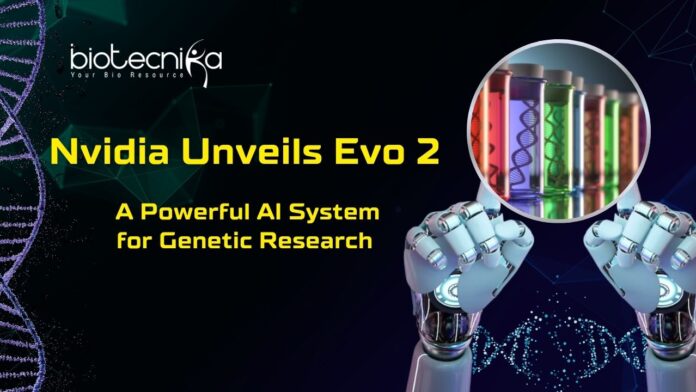Nvidia Unveils Evo 2: A Powerful AI System for Genetic Research
Nvidia, a leader in high-performance computing, has unveiled Evo 2, a powerful new system designed to advance biological research. Developed in collaboration with the Arc Institute and Stanford University, Evo 2 is being hailed as the most extensive computational platform for genetic analysis, with the potential to accelerate discoveries in medicine and genetics.
Evo 2 has been engineered to read and design genetic code across various life forms, ranging from bacteria to plants and humans. Scientists believe this breakthrough technology could significantly speed up research by identifying complex genetic patterns that would typically take years to analyze manually.
Harnessing Massive Genetic Data for Breakthroughs
The system has been trained on an extensive dataset of nearly 9 trillion genetic sequences from more than 128,000 organisms. Evo2 can uncover critical insights into biological structures, mutations, as well as evolutionary changes they can process this vast genetic information.
One of its early successes has been in identifying harmful genetic mutations. In initial testing, Evo 2 accurately detected 90% of potentially dangerous mutations in BRCA1, a gene associated with an increased risk of breast cancer. Evo2 ability to predict as well as analyze mutations could play a crucial role in early disease detection, enabling more precise and personalized medical treatments.
Advancing Medicine with AI-Driven Precision
Scientists believe Evo 2’s capabilities could revolutionize precision medicine by assisting in the development of targeted gene therapies. Unlike traditional treatments that can affect both healthy and diseased cells, gene therapies designed with Evo 2 could be more selective, reducing side effects and increasing treatment efficacy.
Beyond human medicine, researchers see broader applications for the system in fields such as agriculture and environmental science. Evo 2’s ability to analyze as well as design genetic sequences could help develop more resilient crops that can withstand climate change. Along with that, scientists are exploring how the system could offer new ways of addressing sustainability challenges.
Cutting-Edge Computing Power Behind Evo 2
The model was built using 2,000 Nvidia H100 processors operating on Amazon’s cloud infrastructure. This high-performance power allows Evo2 to process complex genetics with unprecedented speed, making large-scale biological research more efficient than ever before.
Nvidia has made Evo 2 freely accessible to researchers worldwide through its BioNeMo research platform. This open access ensures that scientists across different disciplines can leverage the system’s capabilities to push the boundaries of genetic research.
An assistant professor at Stanford University, Brian Hie, highlights the transformative impact of Evo 2 on biological research. He stated that “designing new biology has traditionally been a very laborious, unpredictable, and artisanal process. Evo 2 is making biological complex design more accessible for researchers.
Collaboration Driving Innovation
Evo 2 is the result of a partnership between Nvidia and the Arc Institute, a nonprofit research center dedicated to tackling long-term scientific challenges. Established in 2021 with $650 million in funding, the Arc Institute collaborates closely with Stanford University, UC Berkeley, and UC San Francisco.
The Evo 2 project is set to revolutionize by combining Nvidia’s advanced computing power with advanced biological research. The genetic study is paying the new way for medical breakthroughs, agricultural advancements as well as environmental sustainability solutions.






























